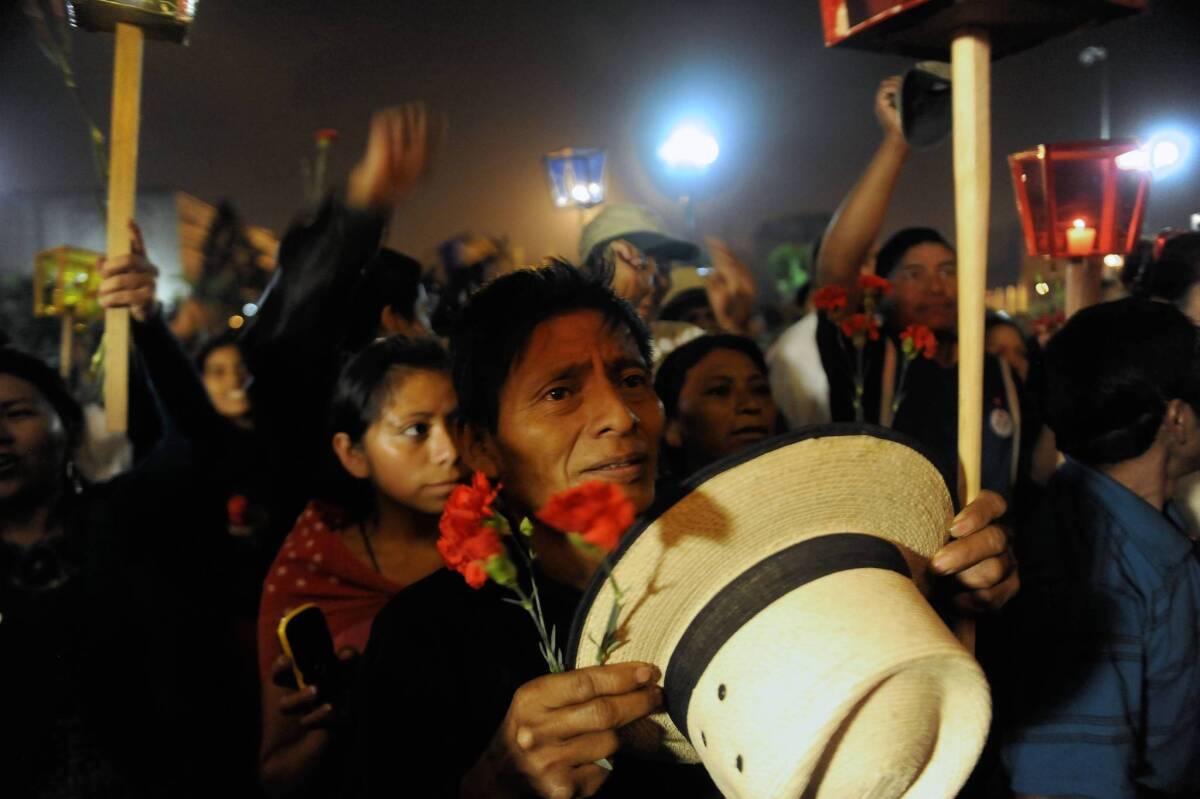Guatemala war crimes trial rulings spur protests

- Share via
MEXICO CITY — Contradictory court judgments in the war crimes trial of former Guatemalan dictator Gen. Efrain Rios Montt this week set off protests in Guatemala City and prompted rebukes from human rights organizations around the world.
On Friday, Judge Jazmin Barrios, who is presiding over Rios Montt’s genocide trial in Guatemala’s capital, called court to order despite another judge’s ruling a day earlier granting an appeal by the defense to annul the case based on a technicality. The Thursday ruling was “illegal,” Barrios said.
Rios Montt’s defense did not show up in court Friday, however, leaving the 86-year-old former military ruler alone at the defense table.
Without counsel for the defendants, the trial was suspended, prompting crowds to rally in protest.
The developments came after nearly a month of wrenching courtroom testimony from survivors of a counterinsurgency campaign that brutally targeted members of the Ixil Maya minority in 1982 and 1983, considered the bloodiest period of Guatemala’s 36-year civil war.
Prosecutors say Rios Montt and his former military intelligence chief, Jose Mauricio Rodriguez Sanchez, ordered a campaign to wipe out the Ixil Maya, including women, children, and elderly adults. Truth commission reports have found that military commanders believed Marxist guerrillas had indoctrinated the community, making them enemies.
As Barrios shut down the trial Friday, cries of “justice!” erupted in the courtroom where Rios Montt still sat. Later, Ixil witnesses and supporters who had traveled to the capital from their region of Quiche marched from one justice building to the other, many chanting “Genocide did happen.”
The chants were a direct response to a media campaign launched this week by Guatemala’s right-wing, denying that an effort to wipe out an ethnic minority had occurred during Central America’s bloodiest war.
Many young Ixil, including those born after the massacres, held up signs that read in Spanish, “We youth have a right to know the truth,” American blogger Xeni Jardin wrote on Twitter.
Meanwhile, prosecutors said they would file appeals, and they were reportedly forming a separate procedural case against Carol Patricia Flores, the judge who annulled the trial Thursday.
The court decisions pushed the legal drama into murky political territory and complicated the Rios Montt trial for Guatemala’s judiciary. Guatemala’s current president, Otto Perez Molina, was implicated by a witness this month in the executions of Ixil Maya villagers.
“This is a blow to the numerous victims of the atrocities committed during Guatemala’s civil war, who have been waiting for more than 30 years for justice to be done and for remedies,” United Nations human rights spokesman Rupert Colville said Friday in Geneva.
In New York, leading human rights groups also denounced the Thursday ruling and called for Guatemala’s highest court to reverse it and allow the Rios Montt trial to resume.
“For years, this case and ones like it have been delayed by dilatory maneuvers and acts of intimidation against victims and justice officials alike,” said Reed Brody, senior counsel at Human Rights Watch. “This hyper-technical decision is deeply troubling and should be reversed immediately so that the trial can continue.”
Manolo Vela, a Guatemalan academic who served as a government investigator in the successful 2011 prosecution of lower-ranking military officers for the Dos Erres massacre of 1982, said the sudden turn of events suggests other forces might be at play.
“What’s clear is that despite certain advancements in the justice system, there are still slits, openings, through which corruption or the interests of the powerful can infiltrate,” said Vela, a social sciences professor at Universidad Iberoamericana in Mexico City.
Barrios said Guatemala’s Constitutional Court has three days to respond to petitions to reverse the annulment or prosecutors will have to restart their case from the beginning.
Hernandez is a news assistant in The Times’ Mexico City bureau.
More to Read
Sign up for Essential California
The most important California stories and recommendations in your inbox every morning.
You may occasionally receive promotional content from the Los Angeles Times.










